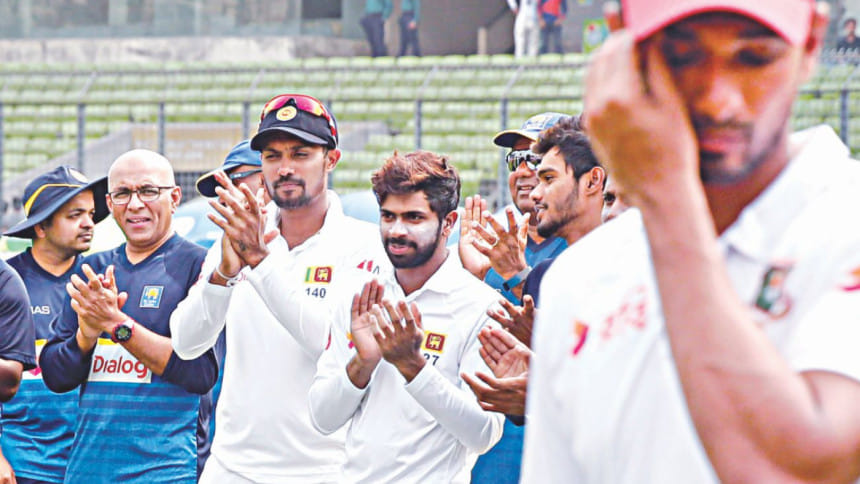Tigers fail in intent and execution

Soon after the post-match press conferences after Bangladesh's capitulation for 123 brought an early end to the second Test against Sri Lanka yesterday, media personnel returning to the Sher-e-Bangla National Stadium press box were greeted by an email from the BCB announcing the 15-man T20I squad for the two matches that will follow shortly.
That does not necessarily mean that the authorities timed the email to try and shift focus away from an embarrassing 215-run defeat, but it is now clear that the players and those involved with the team are guided by the intent -- a loaded word these days -- to never look back regardless of the valuable lessons the past may hold.
In an environment where excuses have become a depleted resource because of overuse, few things other than the unwillingness to learn from and correct major flaws can explain the consistency of batting debacles that date back to last year's South Africa tour. Conditions may have changed from South Africa -- where Bangladesh crashed to heavy defeats with the team being bundled out for 90, 147 and 172 in three of the four innings on relatively flat wickets -- but the players' confused approach and explanations have remained constant.
On a wicket where Sri Lanka scored 222 and 226, Bangladesh's batsmen went about the chase of 339 as if the target was to finish the match on the third day yesterday, regardless of whether it ended in a win or defeat. The usually calm and methodical Mominul Haque did top-score with a 33 but he was anything but composed during his 47-ball stay, at one stage trying out the reverse sweep and uncharacteristically chasing deliveries before pursuing one too many.
The same could be said two times over for opener Imrul Kayes, as he repeatedly went for airy shots against spinners on a turning wicket and never looked like he seriously thought that he would be able to stay at the wicket like Sri Lanka's three-Test rookie Roshen Silva, who played a total of 269 deliveries to score twin tons in the match. Mushfiqur Rahim also brought out the reverse sweep in his 51-ball 25, but he revealed a panicked mindset when he lunged forward to Rangana Herath and was stumped.
When asked about the difference between the batting approaches of Silva and Kusal Mendis -- who hit a tone-setting fifty in the first innings -- stand-in skipper Mahmudullah Riyad's answer was reminiscent of something then-skipper Mushfiqur said during the South Africa debacles.
"There is only one difference. If you look at the bowling of [Rangana] Herath, Dilruwan [Perera] or Akila [Dananjaya]... we had to take a lot of risks to hit boundaries," said Mahmudullah, completely missing the fallacy built within the statement. "On the other hand, when our bowlers bowled -- on this wicket the more you make the batsmen play forward, the harder it is -- they bowled five good balls in the over but gave one boundary ball. This released pressure from them [Sri Lanka] and I think that is something we have to work on.
"Our spinners should have bowled better, but our batting was responsible for the loss," he added almost as an afterthought.
In South Africa too, after repeated failures from the batsmen to score runs on wickets where the hosts were exceeding 500 with minimal damage as a matter of course, Mushfiqur blamed the batsmen saying at one point that even he, a wicketkeeper, would have done as good a job if he turned his arm over. The difference of course is that in South Africa the bowlers failed to get wickets and were culpable, and here they are the group that actually did their jobs by taking 20 Sri Lanka wickets.
The fallacy built within the boundary statement is that of Silva's 126 runs in the match, only 58 came from boundaries. The rest relied on the intent and execution to rotate the strike.
Intent has been a buzzword for Mahmudullah before and after the Test. There has to be positive intent, he said yesterday too. It has to be asked whether there was actually the intent to tailor their batting to the needs of a turning Mirpur wicket or whether the intent just showed up in words and the batting was left to the age-old reliance of playing the natural game. On their home pitch, where Silva showed that the ball has to be played, if there was training focused on the need to rotate the strike, it was woefully lacking in execution.
When asked whether this will destroy their confidence, Mahmudullah said with a smile that they were still confident. If they were confident after a similar spanking in South Africa, was there ever intent to learn from mistakes?
There was one excuse left in the tank. "Massively, I think we missed his batting and bowling," said Mahmudullah about the injury-induced absence of regular skipper and ace all-rounder Shakib Al Hasan. "He can read the batsmen very well and fast and is also a world-class batsman."
Shakib can still help. He will return to captain in the T20Is, and even one win in the two-match series will neutralise much of the stench of this defeat.

 For all latest news, follow The Daily Star's Google News channel.
For all latest news, follow The Daily Star's Google News channel. 








Comments